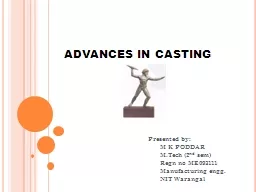PPT-Casting and Abstract classes/methods
Author : chipaudi | Published Date : 2020-06-15
94 extension Type Casting Type Casting is essentially changing the data type Remember our Dice we generated a random number using Mathrandom which returns a
Presentation Embed Code
Download Presentation
Download Presentation The PPT/PDF document "Casting and Abstract classes/methods" is the property of its rightful owner. Permission is granted to download and print the materials on this website for personal, non-commercial use only, and to display it on your personal computer provided you do not modify the materials and that you retain all copyright notices contained in the materials. By downloading content from our website, you accept the terms of this agreement.
Casting and Abstract classes/methods: Transcript
Download Rules Of Document
"Casting and Abstract classes/methods"The content belongs to its owner. You may download and print it for personal use, without modification, and keep all copyright notices. By downloading, you agree to these terms.
Related Documents














